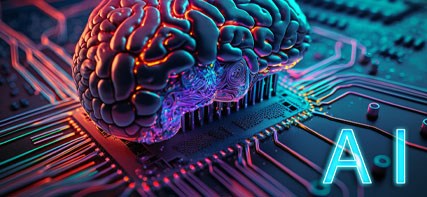
Artificial Intelligence, commonly abbreviated as AI, is a transformative technology that has revolutionized various aspects of our lives. With its roots dating back to the mid-20th century, AI has evolved from a theoretical concept to a practical application that shapes the way we interact with machines, make decisions, and solve complex problems.
At its core, AI refers to the simulation of human intelligence in machines that are capable of performing tasks that typically require human intelligence. These tasks include understanding natural language, recognizing patterns, learning from experiences, and making informed decisions. AI systems use algorithms and data to mimic cognitive functions, enabling them to solve problems, optimize processes, and even engage in creative endeavors.
The journey of AI began with the pioneering work of computer scientist Alan Turing, who introduced the idea of a machine that could simulate any human intelligence task. Over the decades, AI research has led to the development of various techniques and approaches, including machine learning, neural networks, and deep learning.
One of the significant milestones in AI history is the creation of the first expert systems in the 1970s and 1980s. These systems were designed to replicate the decision-making capabilities of human experts in specific domains. As technology advanced, AI's capabilities expanded, leading to breakthroughs in areas such as natural language processing, computer vision, and robotics.
AI's impact is evident across a wide range of industries and sectors. In healthcare, AI-powered diagnostic tools can analyze medical images and data to assist doctors in accurate disease detection. In finance, AI algorithms process vast amounts of data for fraud detection and algorithmic trading. AI-driven virtual assistants like Siri and Alexa have become part of our daily lives, making our interactions with technology more intuitive.
Autonomous vehicles, powered by AI, are on the brink of transforming transportation by enhancing safety and efficiency. AI is also reshaping customer experiences through personalized recommendations and chatbots that provide instant assistance. Industries as diverse as agriculture, entertainment, manufacturing, and education are embracing AI to optimize operations and offer innovative solutions.
As AI continues to advance, it raises important ethical considerations. The potential for bias in AI algorithms, the impact on employment, and the responsibility for decision-making in autonomous systems are among the complex issues that require careful examination. Ensuring transparency, fairness, and accountability in AI development and deployment is crucial to harnessing its benefits responsibly.
The journey of AI is far from over. As technology evolves, AI will likely become more integrated into our daily lives, driving further innovation and transformation. Whether it's improving healthcare outcomes, making our cities smarter, or unlocking the mysteries of the universe, AI holds the promise of a future where machines and humans collaborate to achieve remarkable feats.
In conclusion, Artificial Intelligence is a dynamic field that continues to reshape the world we live in. With its ability to learn, adapt, and perform complex tasks, AI has the potential to unlock new possibilities and redefine what is achievable in the realm of technology.